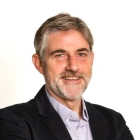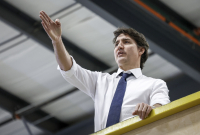Support strong Canadian climate journalism for 2025
If you believe the race to cut climate pollution requires a strong mandate from the public, the latest polling makes for grim reading.
You probably know that climate action has dropped down the list of public priorities, mostly displaced by affordability and, to a lesser extent, housing and health care. But there’s also a disturbing gap between the public’s desire for action in principle and support for climate actions when they come into practice. And the gaps appear to be widening.
One of the most worrying is the gap between scientists and the public. Last week, we looked at the chasm between Conservative voters and other Canadians on the question of what’s causing climate change. Half of those who voted Conservative in the last federal election acknowledge that climate change is a fact, but say it is mostly caused by natural changes and cycles. Less than one-third accept the scientific consensus that it’s caused by human activities.
And the trendline shows that figure has dropped 13 percentage points among past Conservative voters since 2021, according to tracking by the Angus Reid Institute. Those who voted for other parties are far more likely to understand that climate change is caused by human activity. But even in those groups, the trendlines are disturbing: a drop of five points among past Liberal voters and nine for the NDP.
Overall, the percentage of Canadians who describe climate change as human-caused has declined from 71 per cent in 2021 to 62 per cent today. A trend that other pollsters are finding as well.
There’s a similar trend in support for specific climate policies. The recent report, What do Canadians Really Think About Climate Change, describes it as an “action gap.” Disclosure: I was one of the authors of the report by Re.Climate, based at Carleton University.
We reviewed 91 public opinion surveys and found that “in principle, Canadians say climate change is a crisis that requires immediate action.
But the public is conflicted over whether the country is doing enough. Over half say the government is not working hard enough and a similar proportion say Canada is doing its fair share.
Chart by Re.Climate
When it comes to specific policies, it won’t surprise anyone to hear there’s been a drop in support for the carbon tax. The carbon tax has been getting clobbered for many months, but the punishment extends well beyond pollution pricing.
Here’s one other example: When it comes to regulating pollution from Canada’s electricity grid, positive attitudes about clean electricity regulations have dropped 18 percentage points since summer 2023 (a finding from Innovative Research Group).
And there’s widespread confusion about fossil fuels as a prime cause of climate breakdown. Canadians overwhelmingly understand we will need more electricity and say they want it to come without carbon pollution. But two-thirds simultaneously support building gas plants.
Chart by Re.Climate
If you’ve been following dispatches about the state of the climate itself over the past 10 months, you’ll know the most disturbing gap of all is the one between the current temperature trajectory and every prior year on record. I know a good many of you read my newsletter on a Sunday morning and the gulf between physical reality and softening public opinion can be more than enough to shrink back under the covers.
But if you can bear to peek through a gap in your blankets, Louise Comeau has some recommendations to help turn things around. We’ve tapped Comeau’s advice before, particularly on the importance of fairness in implementing renewable energy projects. More recently, she’s become a member of Canada’s Net-Zero Advisory Body.
There are a few major drivers behind the softening of public opinion. The impacts of inflation and the cost of living have knocked climate change down the list of priorities. While these legitimate anxieties occupy our attention, they also make unstable beliefs vulnerable to disruption.
Comeau says that climate advocates, journalists and communicators of all types have been too quick to move on from instilling the basics — the scientific consensus that burning fossil fuels creates a thickening blanket of heat-trapping pollution. “It’s real, it’s human-caused and it’s affecting us today — we’ve forgotten that those three points need to be in every communication.”
Unstable beliefs are susceptible to counter-campaigning. And the axe-the-facts campaign has been relentless. Canadians are also exposed to well-funded greenwashing about “solutions” along with claims designed to sow doubt and undermine confidence in fossil fuel alternatives.
Unstable beliefs are also vulnerable because of two gaps in our thinking about climate change. Comeau emphasizes that both can be addressed by concerted communication.
One is the distance gap, the sense most people still have that climate change is a distant threat that will impact other people, in other places, in the foggy future.
Second is the perception gap — people generally (and falsely) believe they are more supportive of climate action than others. “This psychological barrier is like a self-fulfilling prophecy,” Comeau says. “This is why talking to friends and family about our concerns about climate change is so important… We have to build the social norms that we expect each other to be people who do something about climate change.”
There’s no denying it’s a tough environment for climate action at the moment. But, as the old saying goes, progress comes when preparation meets opportunity. The context is ever-changing and climate change will likely spike to new heights of urgency. And the work to stabilize beliefs will have been crucial.
True to form as a social scientist, Comeau has given us a framework to make sense of the polling trends and a pathway to stabilize public attitudes. She lands on the crucial importance of building social efficacy — the public’s confidence that we have begun taking actions that are working and the desire to build momentum. “Remember to talk about actions that are succeeding.”
Infographic by Louise Comeau/RE.Climate, 2024
Chris Hatch writes Canada's National Observer's celebrated Sunday newsletter, Zero Carbon. Chris is the former executive director of Rainforest Action Network as well as the former executive editor at Canada's National Observer. He is now a columnist at National Observer and writes the acclaimed Sunday newsletter, Zero Carbon.






Comments